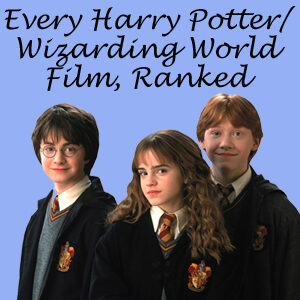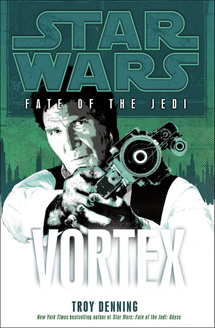You hear a lot about how women always go for the bad boy, but in “Vortex” (November 2010, hardcover), the sixth in the nine-book “Star Wars: Fate of the Jedi” series, it’s Ben Skywalker who falls for the bad girl. Although Luke tells his son several times over the course of their mission that he must not fall in love with this attractive Sith adept, it’s obvious that Ben is doing exactly that.
Luke warns his son: “Ben, I know you like bringing pretty girls to the light side, but Vestara isn’t Tahiri. She was raised Sith.”
With “Vortex,” we’re getting into juicy character stuff with this latest generation of the Skywalker clan, the good-hearted teenager who opted to join his dad on a galaxy-spanning, soul-searching mission when Luke was banned from Coruscant by Chief of State Daala. While Ben follows the classic template of someone getting into a relationship to “improve” the other person, Vestara’s point of view is convoluted in a deliciously Sith way. As she tells her master, Taalon, “I think I may be falling in love with him, but … I don’t want to.”
Like the true Sith that he is, Taalon seizes the opportunity to use Vestara’s emotions as a tool to manipulate Ben:
“But you must, my dear. If young Skywalker senses that you are falling in love with him, then he will fall in love with you. … All I demand is that you use what you feel — just as you would use your anger or your pain.”
Early in the story, Ben saves Vestara’s life, but by the end, she has done him one better: “That’s twice,” Luke observed. Ben nodded, knowing that his father was referring to the number of times Vestara had saved their lives, then smiled. “She can deny it all she wants,” he said. “But she’s absolutely fallen for me.”
Author Troy Denning has the tricky task of writing a love story where the two subjects are enemies. Indeed, at one point, they get into a lightsaber duel. Generally, though, he writes both Ben and Vestara from the romantic perspective that two people are destined to be together, and while that may not be representative of reality, I personally am a sucker for it (and besides, “Star Wars” is fantasy, right?).
The strength of “Vortex,” and the series as a whole, is Luke passing on his knowledge to his son. Luke is the perfect guide for Ben’s romance, oddly enough, because Luke turned Mara — Ben’s mom — back from the Dark Side in the very first post-“Return of the Jedi” novels, Timothy Zahn’s Thrawn trilogy.
Stories about people falling to the Dark Side or turning back to the Light Side go to the heart of “Star Wars.” The problem with many of them is that they don’t offer anything new, but this romance story feels fresh, even as it gets at the root of what George Lucas intended “Star Wars” to be.
Indulge me in a bit of an aside, if you will. As “Star Wars” fans know, Lucas never had a concrete idea for the much-rumored movies that would take place after “Return of the Jedi,” but in a 2008 interview with Total Film magazine, he did say what those theoretical films wouldn’t be:

“There will definitely be no Episodes VII-IX. That’s because there isn’t any story. I mean, I never thought of anything. And now there have been novels about the events after Episode VI, which isn’t at all what I would have done with it. … The Emperor doesn’t get cloned and Luke doesn’t get married …”
On the other hand, in a 1983 interview for Denise Worrell’s book, “Icons: Intimate Portraits,” Lucas said he had a notion of how the adventures of Luke Skywalker would continue after “Return of the Jedi,” even if he had nothing close to a script: “The sequel is about Jedi Knighthood, justice, confrontation, and passing on what you have learned,” Lucas is quoted as saying.
So in a sense, “Fate of the Jedi” isn’t the fate Lucas would’ve chosen for Luke (marriage and a son), but in another sense, Lucas’ notion does indeed jive with the story in these books, because Luke is very much passing on what he has learned to his son even as they both confront the Dark Side once again and Ben moves toward attaining Jedi Knighthood.
“Vortex” also deals directly with justice as it chronicles the trial of Tahiri, who killed Galactic Alliance Admiral Pellaeon on an order from Jacen Solo, a.k.a. Darth Caedus, in the previous nine-book arc, “Legacy of the Force.” Was Tahiri committing murder, or following a military order? It’s a fascinating question, and although it’s somewhat odd that Denning’s portrayal of Coruscant courtroom drama is identical to an American courtroom drama, I’ll stick around for the answer. (I don’t like what Tahiri did, but I’m pulling for a “not guilty” verdict. Maybe I have a thing for bringing pretty girls to the light side, too.)
There’s also Daala’s twisted take on justice to consider. The former Imperial admiral is now acting like an Imperial in her role as Galactic Alliance chief of state — essentially starting a war with the Jedi after they tire of her notion of justice, which includes carbon-freezing troublesome Jedi and other political rivals.
The characterization of Daala as an out-of-control despot seems like a contrivance to create a powerful villain, and frankly, I didn’t enjoy following the similar spiral of the initially well-meaning Jacen Solo in “Legacy of the Force” (or, for that matter, the fall of the initially well-meaning Anakin Skywalker in “Revenge of the Sith”).
Nonetheless, there are enough developments floating around in this series — both contrived and earned — that it should lead to an entertaining final three books. We’ve got the Jedi versus the Alliance, but some Alliance members don’t agree with Daala’s approach. We’ve also got the Lost Tribe of the Sith versus Luke and Ben, but Ben thinks he can save Vestara.
I don’t know if he can or not, and that’s a great place to be as a reader.

